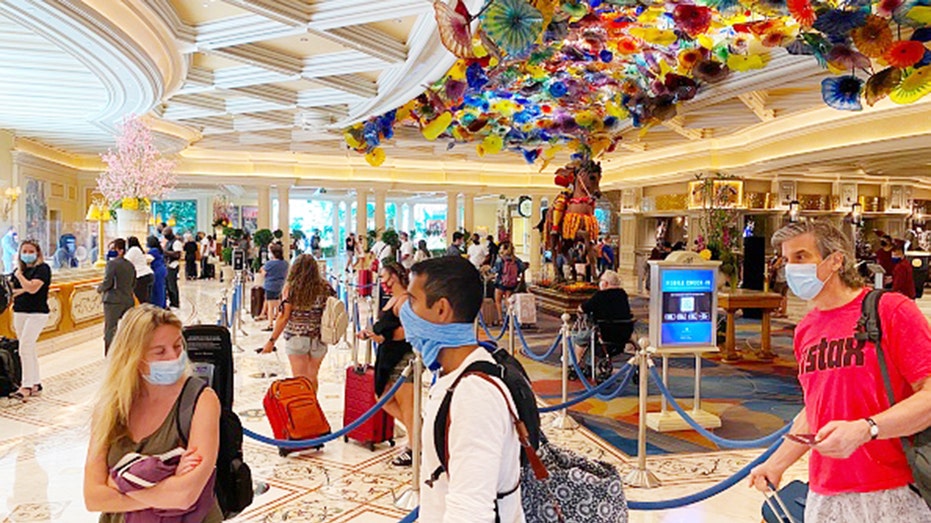The reintroduction of COVID-19 lockdowns in California and other states adjacent to Nevada poses an emerging risk to Las Vegas casinos battling to recover from both the pandemic and efforts to contain it.
The new restrictions threaten to choke off the automobile traffic from Nevada's neighbors that has helped the city's storied casinos stay afloat over the past several months while destination air travel that typically underpins the area's tourism remains limited.
"With drive-to business driving the majority of Strip revenues right now, increasing California restrictions/quarantines are a real risk for Strip operators -- especially in a seasonally slower time of year," Barry Jonas, director of equity gaming research at Truist Securities, told FOX Business.
BITCOIN NO MATCH FOR GOLD IN CORONAVIRUS WORLD
Las Vegas Strip gaming revenue was $2.72 billion through September, down 45% from a year ago, after casinos were ordered in March to close for nearly three months to help slow the spread of COVID-19. Gaming accounts for 33% of Strip revenue.
The closings, which were the first since former President John F. Kennedy’s assassination in 1963, brought the Las Vegas Strip to a standstill, causing revenue to plunge 99% year-over-year in April and May. Business has slowly returned since casinos reopened in June, drawing customers within driving distance as they began venturing further outdoors.
Average daily auto traffic surged 8.1% year over year in September to 126,888 vehicles per day, according to Las Vegas Convention and Visitors Authority data. That follows annual declines of 13%, 10% and 4% in June, July and August – after casinos reopened.

Tourists wear mandatory masks as they wait to check-in at the Bellagio hotel and casino in Las Vegas on August 28, 2020, amid the coronavirus pandemic. (Photo by DANIEL SLIM/AFP via Getty Images)
By comparison, travel into McCarran International Airport declined 57% in October from a year earlier, a drop that followed year-to-year slides of 77%, 64%, 61% and 61% in the months from June through September.
CORONAVIRUS VACCINE NOT CURE-ALL FOR BOND INVESTORS
The gains, however halting, are jeopardized by California Gov. Gavin Newsom's announcement Thursday of an overnight curfew aimed at curtailing the surge in new COVID-19 infections.
A spike in cases as winter approaches in the U.S. has driven the total number of infected Americans to nearly 12 million.
The pandemic has killed more than 250,000 people in the country, its largest death toll in any nation in the world.
Newsom's order, which covers 94% of the state’s population, calls for “non-essential work, movement and gatherings” to stop between 10 p.m. and 5 a.m. local time. Included is Los Angeles County, which accounted for 19% of Las Vegas visitors in 2018, according to Visitors Authority data.
Stocks in this Article
A further blow could come from Nevada Gov. Steve Sisolak, who on Thursday said new measures directed at slowing the spread of the virus would be announced shortly. It is unclear if those measures would include reclosing casinos, something the governor likely hopes to avoid because of the industry’s importance to the state’s economy.
Hotels and casinos in Southern Nevada employed about 164,400 people, or 16.8% of the state’s workforce. The unemployment rate in Las Vegas was 14.8% in October, down from 33% in April.
While further restrictions would cause more pain for workers and the industry, casino operators have already cut lower-margin amenities such as buffets and poker rooms, meaning they will be “more prepared,” Jonas said.
Despite the looming challenges, the industry is expecting a sharp rebound on the other side of the virus, a prospect that grew more real last week with Pfizer and BioNTech seeking emergency use authorization for their jointly-developed coronavirus vaccine.
CLICK HERE TO READ MORE ON FOX BUSINESS
“The pieces of our database that are missing or lagging, they're the most profitable pieces of our database. It's the 55-and-over cohort that's not coming,” Caesars Entertainment Inc. CEO Tom Reeg said on the company’s third-quarter earnings call on Nov. 5.
“These are people that are not going anywhere and are not spending and are going to come out of this with significant pent-up demand and spending power,” he added. “And it's going to be extremely powerful what you'll see, I think across the entertainment space, but particularly in casinos and particularly in Las Vegas.”
| < Prev | Next > |
|---|







 Copyright © 2025 ToCasino.net Online Casino. All Rights Reserved. Designed by
Copyright © 2025 ToCasino.net Online Casino. All Rights Reserved. Designed by